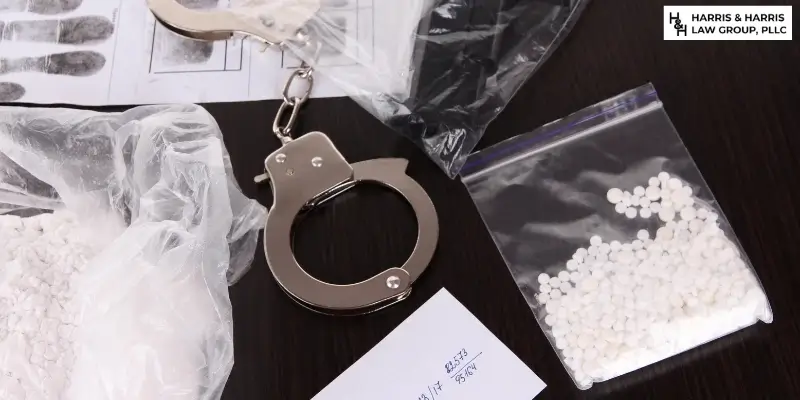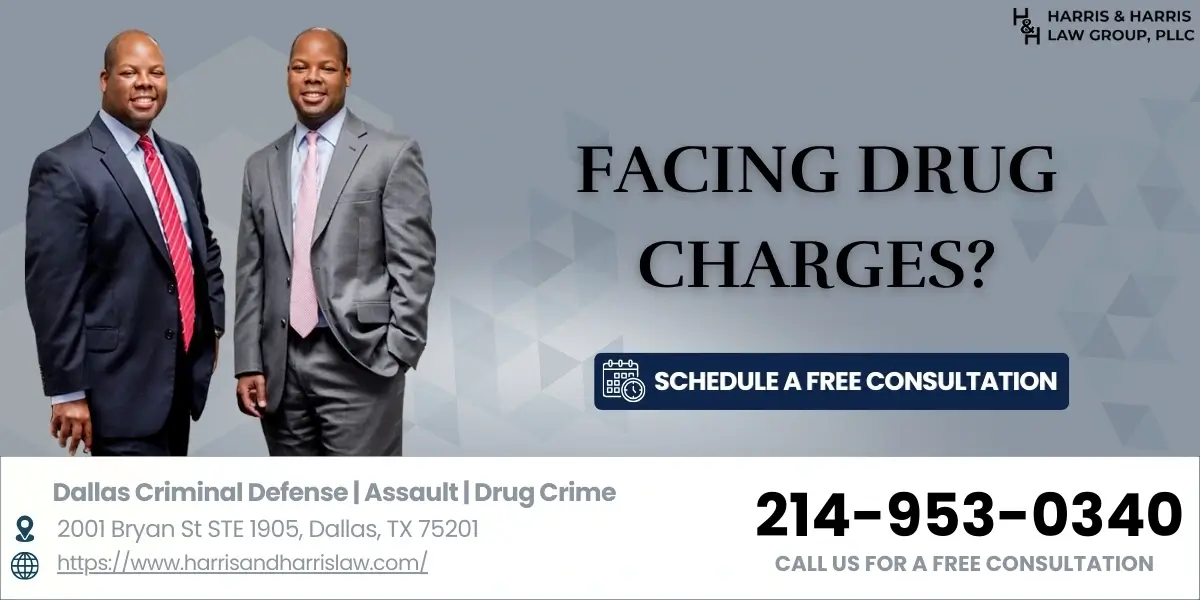Dallas Drug Crime Lawyer

Dallas Drug Crime Attorney
Drug-related criminal offenses are some of the most commonly prosecuted crimes in the state and throughout the United States each year. If you or a family member was recently arrested for any type of drug offense, a Dallas drug crime lawyer is the ideal resource to have on your side as you formulate a defense and attempt to avoid conviction. It’s vital to connect with defense representation at your first opportunity after an arrest.
The Harris & Harris Law Group, PLLC, has years of professional experience in defense representation. As former prosecutors, our attorneys are uniquely positioned to provide a high level of legal counsel that many other attorneys in Dallas simply cannot match. When you choose our firm as your representation, you are investing in an attorney to guide you to a positive outcome in your case.
Why You Need a Dallas Drug Crime Lawyer
You have the right to legal representation when you are charged with a crime, and it is vital that you take full advantage of this right, even if you believe the charges against you are minor. Even low-level drug offenses can lead to harsh penalties in the Dallas criminal court, and the record of your conviction can cause all types of problems in your life for years to come.
Drug laws with severe penalties are commonplace in the nation’s “War on Drugs,” and Texas drug laws are no exception. The key to overcoming or reducing drug charges can lie in mounting a vigorous defense from the very outset of the accusations against you. If you delay working with an experienced Dallas drug crime attorney such as those at Harris & Harris Law Group, you allow the prosecution a head start in putting together a solid drug case against you.
At Harris & Harris, we know Texas drug laws and are familiar with prosecutorial tactics for developing their drug cases. Communities throughout Dallas will benefit from our expertise in creating a strong defense against potentially damaging drug charges.
Drug Possession Crimes and Penalties in Dallas
One of the most common drug offenses in any state is possession. Texas law sets out a classification system for controlled substances, which includes both illegal drugs and legal drugs that require a prescription. For instance, marijuana is in a category by itself, and possession of marijuana generally results in less severe penalties than possession of other illegal drugs, such as methamphetamine. The exact penalties for a drug possession charge will differ according to the classification of the illegal drug found in your possession, as well as the weight or amount of the drug that you possessed.
Possession of any type of illegal drug can result in either misdemeanor or felony charges. For instance, possession of less than two ounces of marijuana constitutes a Class B misdemeanor under Texas law, which carries a jail sentence of up to 180 days and a fine of up to $2,000. At the other extreme, possession of more than 2,000 pounds of marijuana is an enhanced first degree felony, which can result in a prison sentence from five to 99 years, and a fine of up to $50,000. As a result, drug possession sentences vary widely. Additionally, any drug conviction under the Texas Controlled Substances Act can lead you to lose your driver’s license for up to six months and may make you ineligible for federal student loans and other federally funded loan programs.
It is important to remember that many drug charges are accompanied by additional charges. For example, if you are caught driving while under the influence of drugs, the police will likely search your vehicle. In this situation, you could face a charge driving while intoxicated (DWI) along with a drug possession charge. Multiple charges in a single incident could escalate the severity of your sentence dramatically.
Drug Dealing – The Manufacture and Delivery of Drugs
Texas law refers to any kind of drug dealing as manufacturing and/or delivering drugs. The “delivery” of drugs occurs whenever you give a controlled substance, or even a fake controlled substance, to another person, whether money changes hands or not. Therefore, under Texas law, delivering drugs is equivalent to dealing drugs, with the exception of very small amounts of marijuana.
The penalties for drug dealing are far more severe than the penalties for drug possession, but, similarly, they depend on the amount or weight of the drugs involved, as well as your existing criminal history and the classification of the particular drug under Texas law. Additionally, you may receive an enhanced sentence for drug dealing if your activities occur within 1,000 feet of a school or youth facility, within 300 feet of a public swimming pool or video arcade, or on a bus. Penalties can range from community supervision for small amounts of certain drugs to lengthy prison sentences for first degree felonies.
Cultivation of Marijuana and Possession of Paraphernalia
In addition to possession of marijuana, possession of marijuana plants or paraphernalia used to cultivate marijuana are also crimes under Texas law. The severity of the criminal charge depends upon the number of plants possessed, or the extent of the paraphernalia possessed. Possession of even a few marijuana plants could result in a felony charge with penalties of up to five years in prison.
Understanding the DEA Drug Schedule
Texas, like most other states, uses the Drug Schedule made by the Drug Enforcement Agency (DEA) for guidance in sentencing for all drug-related offenses. The DEA schedules drugs into categories based on their perceived level of harm, their potential for abuse and addiction, and whether they hold any medical value. Schedule I drugs are considered to have no medical value and the highest potential for abuse.
When you are charged with a drug offense in the state, the severity of your charge will often depend on the Schedule of the drug, the quantity, and other facts, such as whether the evidence shows you intended to sell, distribute, or traffic the drugs. Penalties for Schedule I and II drugs typically outweigh those assigned for Schedule III, IV, and V drugs, but the reality is that conviction for any drug-related offense can lead to severe penalties.
Possible Penalties for Drug Crimes in Dallas
Drug offenses may be prosecuted as misdemeanors or felonies in the state. At the misdemeanor level, a defendant could face incarceration in county jail, heavy fines, and other penalties assigned at the discretion of the sentencing judge, such as mandatory substance abuse treatment and community service. At the felony level, penalties escalate significantly. A defendant could face several years in state prison, heavier fines, and additional penalties.
It is possible for an offense that normally qualifies as a misdemeanor to be escalated to a felony based on the unique details of the case. If the defendant has a record of prior convictions, it could also work against them and open the door to an escalated sentence. Ultimately, it is vital to consult a Dallas Drug Crime Lawyer as quickly as possible for an arrest for any type of drug-related crime.
Know Your Rights During an Arrest
This is a concise explanation of your constitutional rights in this situation, and you must pay close attention to and understand the importance of exercising these rights. You have the right to remain silent and the right to an attorney, and anything you say during arrest and booking could be used against you.
The Fifth Amendment of the Constitution ensures that you are not required to act as a witness against yourself and are protected from self-incrimination. Comply with their directions but say nothing in regard to the faces or charges allegations until you can speak with a Dallas drug crime lawyer who can represent your defense.
The Sixth Amendment ensures you have the right to legal representation, and you should be allowed to make phone calls following arrest and booking. You should reach out to an experienced Dallas Drug Crime attorney right away so they can immediately begin working on your defense. The faster your attorney can respond to your arrest, the easier it will be for them to collect crucial evidence to support your case.
Pretrial Diversion for Substance Abuse
The Dallas criminal court system recognizes the need for restorative rather than punitive justice in some cases. Pretrial diversion programs exist to provide an alternate pathway when a defendant has committed a crime due to a mental health condition, a substance abuse disorder, or coercion as a victim of trafficking. Many people arrested for drug-related offenses face these arrests as a consequence of addiction.
Pretrial diversion is available only to qualified defendants who apply for these programs. The defense attorney helps their client complete their application and negotiates with the prosecutor handling the case. This is an option only for mostly low-level and nonviolent offenses, and first-time offenders are generally more likely to qualify than defendants who have prior convictions on their record.
If you can prove that you suffer from a substance abuse disorder, your Dallas drug crime lawyer can help you complete your application for pretrial diversion if you qualify. They will negotiate with the district attorney’s office for you, and if you are granted a program, they will help you understand the terms and conditions you must follow to complete the program.
Many defendants who qualify for pretrial diversion because of substance abuse disorders will be required to complete certain conditions to address substance issues. . They may need to attend counseling and complete educational courses as well. Many of these individuals will also be required to complete community service and report to a probation officer on a regular basis. If they violate the terms of their program or commit another offense, they will likely face standard prosecution.
Building a Defense in a Criminal Case
The criminal justice system of the United States functions on the principle that the defendant is innocent until proven guilty beyond a reasonable doubt. This is a high standard of proof that the prosecution must meet to secure a conviction. In every criminal case, the prosecution faces the burden of proof, and it is the defense attorney’s goal to prevent them from accomplishing this.
There are many possible defenses one might employ in a drug crime case in Dallas. They may need to prove a mistake of fact or establish an alibi, showing they could not have committed the offense. Alternatively, they may need to prove a mistake of law or that arresting officers did not follow due process in handling their arrest and booking. Some defendants may need to prove that their rights were violated in some way.
Your Dallas drug crime lawyer can help construct a comprehensive defense by leveraging exculpatory evidence, witness testimony, and other facts that contradict the prosecution’s case. You have a much better chance of avoiding conviction with a defense attorney on your side than you would alone, and if you did break the law, your defense attorney can still help by aiding you in securing a lighter penalty.
Plea Bargaining in Dallas Drug Crime Case
Plea bargains are formal agreements between prosecutors and defense attorneys. A prosecutor may offer a plea bargain if they are certain they can secure a conviction with their evidence and want to conserve court resources. Alternatively, a prosecutor may offer a plea deal if they are not convinced that they can win in court, hoping the defendant will simply choose not to fight the charges and take the deal.
Your Dallas drug crime attorney can help determine whether a plea deal is a viable option. Some defendants may be able to secure reduced or dropped charges, lighter sentencing, or a combination of incentives in exchange for immediate guilty pleas.
What to Expect From Your Dallas Drug Crime Lawyer
The right defense attorney is the most valuable asset you have on your side when you have been charged with a crime in Dallas. They can help determine whether your rights have been violated, what defenses are most likely to help you avoid conviction, or how to avoid the worst penalties that might be assigned to you if you are convicted.
The Harris & Harris Law Group, PLLC, has years of professional experience in criminal defense. As former prosecutors, our attorneys know how the local district attorney’s office is likely to handle your case, what you can expect as your proceedings unfold, and what your most viable defenses may be in your current situation.
Drug Charge Attorney in Dallas, TX
The attorneys at Harris & Harris Law Group have the experience and expertise to handle your drug case from start to finish. Do not risk the increasingly severe penalties for even relatively minor drug offenses under Texas law. Remember that you could face steep fines, significant jail time, and the loss of your driver’s license if the prosecutor successfully convicts you of a drug offense. Are you willing to take that risk? If not, contact us today so that we can begin to build your defense.



